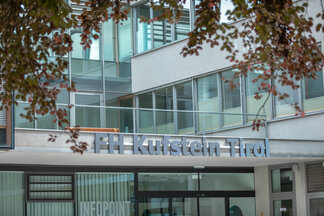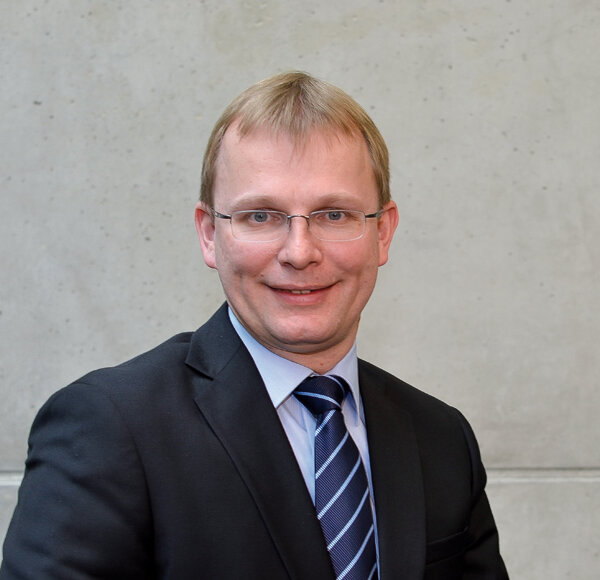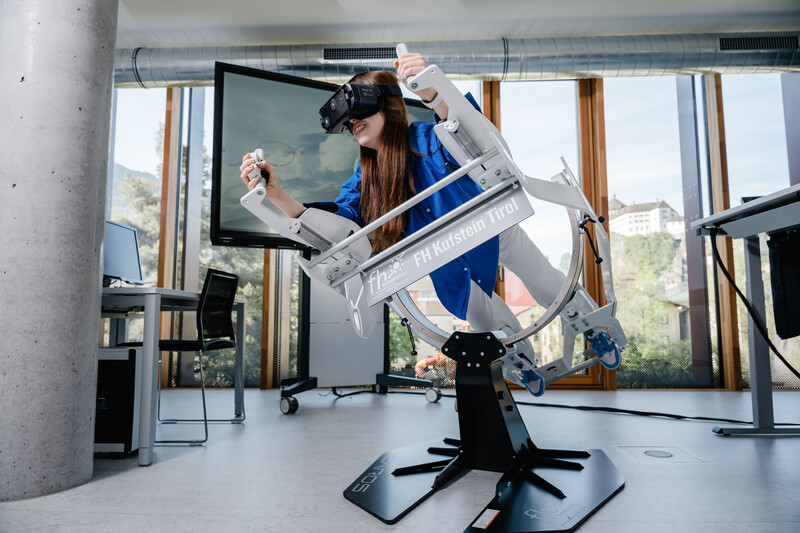Advance your career in the web and IT sector with our part-time Master's degree program in Web Engineering & IT Solutions. Ideal for professionals looking to enhance their technical expertise and stay ahead in the ever-evolving tech industry.

Web Engineering & IT Solutions
Master's degree program
Overview
-
Qualification Level:
Stufe 2, Master -
Price:
Euro 363,36* (excl. Student Union-fees) each semester -
Academic Degree:
Master of Science in Engineering (MSc) -
Academic Program:
Part-time -
Language:
67% German, 33% English -
Remote Options:
E-Learning min. 40 % online -
Exchange Semester:
Supervised study trip in the 2nd semester** -
Admission Requirements:
General admission regulations -
Study Places per Year:
20
Program Description



Do you work at the intersection of IT and business and want to expand your technical expertise? Then our Master's program is perfect for you. Web Engineering & IT Solutions equips you with comprehensive knowledge to implement high-level IT solutions for web-based systems.
The Web Engineering & IT Solutions degree program provides a comprehensive set of pattern recognition skills and the ability to quickly learn new topics. It covers key aspects of distributed IT infrastructures such as scalability and security. The curriculum includes professional project management and management skills. Electives allow for individual customization. A unique feature is the networking with four other Master's programs, which promotes interdisciplinary work and prepares students for a variety of professional fields. An optional preparatory course facilitates a smooth transition into the program.
Study Focus
-
25 %
Expert knowledge in engineering
-
35 %
Expertise in web-based systems
-
10 %
Specialized in-depth studies & electives
-
30 %
Practical knowledge transfer, international skills & Master's thesis
What You Will Learn
-
Requirements management and modern software architectures
-
Softwareentwicklung mit web-basierten Technologien
-
Software development for mobile and embedded systems
-
Design and organization of technical systems
-
Data modeling and storage
-
Cloud Computing
-
Content and application management
Popular Occupational Fields
- Media agencies & web-oriented companies
- Project management/technical management for complex web projects and applications
- Strategic development of web-based business models and innovations
- Head of Software Development for complex web-based systems
- IT Consulting
Career Opportunities
-
430+ vacancies
in IT and data analysis in Tyrol
-
EUR 50,200 average salary
for employees in the IT/data analysis sector in Austria in 2022 (according to WeAreDevelopers).
-
EUR 30.8 billion budget
for investments in IT and data processing in Austria (according to Statista) in 2021; still growing
-
+ 27.48 % increase
of the revenue in the Austrian IT market by 2028 (according to Statista)
-
+3.7% growth
in the European IT sector (according to Gartner).
The path to the Master's degree

The Web Engineering & IT Solutions degree program spans four semesters. In the first two semesters, students learn the fundamentals of development, software architecture, and web technologies. The third semester focuses on expanding and deepening this knowledge through practical, hands-on projects like the integrated practical project. In the fourth semester, students complete their studies by writing their master's thesis.
Special features:
-
Practical project with an application-oriented task
-
Practical knowledge transfer from day one
-
Study trip in the second semester
Recognition of Prior Learning
Students have the option to receive credit for skills and competencies they have already acquired before the start of each semester.
To apply for credit, they must submit a request directly to the Director of Studies.
Director of Studies

Prof. (FH) Lukas Demetz, PhD
Head of IT Services & Software Development, Interim Director of Studies Bachelor Coding & Digital Design / Web Business & Technology, Master Data Science & Intelligent Analytics, Master Web Communication & Information Systems / Web Engineering & IT Solutions
Curriculum
Engineering
Tool-driven project management for web-based architectures
- Semester 1
- 3 ECTS
The course provides students with options of how the management of software projects can be supported with tools. For this purpose, different parts of the project management are identified (e.g. source code management, bug tracking, testing, deployment). Tools for these parts are then discussed, such as GitLab for source code management or Jenkins for CI/CD. In addition, we will demonstrate how individual tools can be linked together to provide a better overview during the project, such as integrating GitLab with Mattermost. The students put the theoretical contents into practice during exercises.
DetailsConcept and design of technical systems
- Semester 1
- 3 ECTS
This course provides students with an overview of the options available when designing new interactive systems or revising existing ones. The focus lies on creative techniques, concepts and methods with which ideas can be generated that enable both more intuitive operation and more innovative use of existing and new interactive systems. In addition, it will be worked out how innovations can be implemented in a practical way from a management perspective. The course content covers the following subject areas in particular: - Developing a holistic understanding of the topics of systemic management. - Methods for generating innovative ideas (e.g. Systematic Inventive Thinking, TRIZ, Design Thinking). - Project structures and management methods for the practical implementation of innovations (e.g. MELT Frame). The course content enables students to apply creative techniques in a structured way, to gen-erate innovations and to accompany their implementation.
DetailsSpecial topics of software engineering
- Semester 1
- 6 ECTS
Further and advanced topics in the field of software engineering are taught in this course. This includes the following focal points: In-depth topics in the fields of requirements analysis (e.g. SOPHIST rules, goal modelling) and design (e.g. design patterns, design principles); in-depth knowledge of agile development methods; procedures in the development of extensible software systems; automation in the development of large software systems (e.g. unit tests, continuous integration and DevOps).
DetailsSoftware development with web-based technologies
- Semester 1
- 6 ECTS
Students are introduced to software development with web based technologies during the lecture. This includes front-end and back-end software development. Students will acquire in-depth knowledge of the structure (HTML), design (CSS and preprocessors), and dynamic aspects (JavaScript and TypeScript) of web applications, as well as their backend develop-ment with current and modern programming languages (e.g. Node.js, Python). Students there-fore gain an overview of the entire development of web applications. Additional content such as front-end frameworks (e.g. Stencil.js, Angular, Vue) is discussed. Furthermore, students are introduced to methods and tools that simplify software development and increase the quality of the code. This includes methods such as code management, code formatting, linting, auto-mation, bundler modules and package management. In addition, students are introduced to different architectures (client/server, 3-tier model) and implementations of web applications (e.g. headless). The content learned is put into practice and consolidated by the students with exercises.
DetailsData modelling and storage
- Semester 1
- 6 ECTS
The following content is discussed in the course: - Data modelling for relational data structures - Database interaction in SQL (DDL, DML, DQL) - Non-relational data storage concepts (NoSQL databases) - Implementing data structures - Integrating data structures into applications
DetailsSoftware development for mobile and embedded systems
- Semester 2
- 6 ECTS
- Challenges of mobile and IoT-based software development - Software architectures of mobile and IoT application platforms - Mobile GIS systems for outdoor and indoor positioning, map display and route calculation - Communication protocols in connection with mobile and IoT systems (MQTT, HTTP, CoAP) - Processing of current research literature in the field of mobile and IoT-based software de-velopment
DetailsModern software architecture
- Semester 2
- 3 ECTS
Advanced topics in the field of software architecture are taught in this course. This includes the following focal points: - Role of software architecture in the software development process - Design of software architectures - Architectural patterns and architectural aspects, such as internationalization - Use of modern software architectures - Documentation of software architectures using UML
DetailsQuantitative Process and Quality Management (Six Sigma) (elective) (WP)*
- Semester 3
- 4 ECTS
The following contents will be discussed in the lecture: - Fundamentals of descriptive statistics - Measurement system analysis - Sample determination - Statistical process control - Process control charts
DetailsHuman-Computer Interaction (elective) (WP)*
- Semester 3
- 4 ECTS
The lecture teaches basic concepts from the field of human-computer interaction (usability, user experience, user interface design) and information visualization. This includes the follow-ing focal points: User interface architectures; design criteria, guidelines and standards for the creation and modelling of user interfaces of interactive systems; approaches and methods (quantitative and qualitative) for the evaluation of user interfaces of interactive systems; web style guides and evaluation criteria for websites (e.g. with regard to accessibility); basics of information presentation and data visualization; interactive information visualization; the theoretical lecture contents are prepared in the exercise using practical examples and implemented in a small project (usability evaluation) in a team.
DetailsAgile Product Development (elective) (WP)*
- Semester 3
- 4 ECTS
- Overview of agile process methods - Roles in the agile process - Flow of an agile project (Sprins, Dailies, Demos, Retros) - Coaching of an agile project (e.g. question techniques) - Experiences with agile projects from software development - Challenges in developing smart products - Methods of product development (e.g. FMEA, TRIZ) - Advantages of hybrid process methods - Role of management in the agile process
DetailsData Visualization and Visual Analytics (elective) (WP)*
- Semester 3
- 4 ECTS
The following content is discussed in the course: - Evaluation tools with visual orientation, e.g. Bl tools such as MS PowerBl, Tableau, QlikView - Display libraries, e.g. matplotlib.pyplot, gglot2 - Rules of visual communication, e.g. Hichert SUCCESSSS
DetailsTrends in ERP (elective)
- Semester 4
- 3 ECTS
- Current developments in the field of business application systems with special reference to ERP systems and business process management - Models, examples, best - practice cases
DetailsTrends in Data Science (elective)
- Semester 4
- 3 ECTS
The contents of this course are not set, but will be adapted to the current prevailing trends. Content examples may include: - New technologies in the field of Big Data Processing - Trends in programming languages in data analysis - New concepts of data processing (e.g. Data Lake) - New questions in the field of data science research - New questions in data science practice
DetailsTrends in Smart Product (elective)
- Semester 4
- 3 ECTS
The contents of this course are not set, but will be adapted to the current prevailing trends. Content examples may include: - Current best practice approaches and concepts in application areas (e.g. Smart Home, Smart City, Smart Production, Connected Vehicles etc.) - Current best practice approaches with regard to development processes and tools - Current research and development activities or research and development results
DetailsTrends in Web-Technologies (elective)
- Semester 4
- 3 ECTS
The contents of this course are not set, but will be adapted to the current prevailing trends. Content examples may include: - New technologies in the field of web architectures - Trends in the field of programming languages on the web - New design concepts in the field of web applications - New questions in the field of research in web technologies and applications - New questions in the field of web development practice
DetailsIT Systeme
Process automation (elective) (WP)*
- Semester 3
- 4 ECTS
- Basic terms: Business process, workflow, BPMS, WFMS, RPA, etc. - Selection criteria for workflow engines for process automation - Architecture and integration of workflows for process automation - Overview of interprocess communication - Transactional properties of processes, simulation and code generation - Basics of Microsoft Dynamics 365: Modules and navigation, basic entities and standard workflows - Organizational and technical implementation with configuration and declarative programming
DetailsApplication-oriented analysis platforms (elective) (WP)*
- Semester 3
- 4 ECTS
The following content is discussed in the course: - Presentation of different user-oriented analysis platforms (e.g. KNIME, RapidMiner, Grafana) - Presentation of different cloud solutions for data analysis (e.g. Google Cloud, AWS, Azure) - Application of the platforms presented using the example of analysis data sets - Discussion of the different approaches
DetailsBusiness Platforms and Cloud Computing (elective) (WP)*
- Semester 3
- 4 ECTS
Students are given an overview of common business platforms and cloud computing. In addi-tion, the advantages and disadvantages of the respective platforms are discussed. Students are therefore able to select suitable platforms for a given problem. Students gain practical experience with selected platforms using case studies. In addition, methods for defining interfaces are discussed with the students.
DetailsInternet of Things (elective) (WP)*
- Semester 3
- 4 ECTS
Introduction - IoT architecture (e.g. reference models) - Requirements for IOT systems - IOT data transmission protocols - Use of IOT in an industrial context (examples) - Basics of sensor technology - Basics of embedded systems Implementation - Procedure for implementing IOT - Prototypical implementation of IOT - Selection of sensors - Data collection, visualization and evaluation - Challenges in implementation
DetailsPractice transfer & empiricism
Proseminar I
- Semester 1
- 2 ECTS
The content of the course is based on the course contents of the current semester, especially the topics development, engineering and web-based systems. The following objectives are pursued during the coaching model and are worked on in small groups: 1) Strengthening the ability to reflect by considering the course contents of the semester in an interdisciplinary context to further consolidate and clarify open questions. This can be done, for example, through further exercises or workshop-like formats. 2) Advanced development of problem-solving skills by advancing/networking subject areas across different courses, which are dealt with in an in-depth work and thus
DetailsStudy trip
- Semester 2
- 3 ECTS
The study trip gives part-time students the opportunity to acquire intercultural competence. Under the guidance of the lecturer, the students find out about potential study destinations, research relevant data and facts about the destination country and organize the program: The week in an international environment includes visits to companies, lectures at partner universi-ties as well as lectures and events in the field of Social Skills. The aim is to ensure that stu-dents acquire an understanding of the cultural mainstream of the country in question. Discus-sions with specialists and executives, visits to foreign trade centers, business and social associations round off the international and personality-building experiences of the study trip.
DetailsProseminar II
- Semester 2
- 2 ECTS
The content of the course is based on the course contents of the current semester, especially the topics of architecture, cloud and e-business. The following objectives are pursued during the coaching model and are worked on in small groups: 1) Strengthening the ability to reflect by considering the course contents of the semester in an interdisciplinary context to further consolidate and clarify open questions. This can be done, for example, using further exercises or workshop-like formats. 2) Deeper development of problem-solving competence by specializing/networking of subject areas across different courses, which are dealt with in an in-depth work, therefore providing further insights for the students; if necessary, also preparatory work for their own knowledge. Work, e.g. in preparation for the Master thesis. In this seminar, the focus lies on topics related to development and engineering, as well as web-based systems. 3) Linking practical information from the profession with your own knowledge. Own work: Enabling the connection of practical work-related experience from the students' field of activi-ty with the contents of the courses of the semester in the form of a more systematic/scientific form, which, similar to point 2, leads to a preparation of one's own knowledge.
DetailsAcademic Methods
- Semester 3
- 2 ECTS
Students gain in-depth knowledge in the field of academic methods by means of a research project to be worked on in a small group. Building on the basic knowledge of techniques and rules of academic methods Students are trained in the field of data analysis including conclusive statistics. This gives students the ability to work on complex scientific questions and to create research designs. This implies both structure and content as well as style and language at a high level. The practical development of the above-mentioned knowledge prepares students both formally and methodically for preparing the Master thesis. The discussion and critical questioning of the scientific methodology of a Master thesis is also included. In order to support the students in their search for relevant and high quality questions, possible topics and hypotheses are discussed and debated.
DetailsPractical Project
- Semester 3
- 4 ECTS
Through independent implementation, the students acquire skills in implementing the acquired knowledge. The entire implementation of a complex project is carried out independently by the students - this includes the conception, budgeting and implementation as well as the evaluation and interpretation of the results. In order to also build on the students' social skills, the projects are carried out in student teams under independent management and team building. Particularly important are skills such as the analysis of recipient behavior, economically responsible decision-making, risk management, intercultural competence, organizational and social skills, budgeting skills, sponsoring and project management. The abovementioned learning and teaching objectives are ensured by an actual implementa-tion of the solution approach.
DetailsColloquium for the Master thesis
- Semester 4
- 2 ECTS
Within the framework of the colloquium on the Master thesis, students are supervised and supported in the preparation of their Master thesis in addition to the individual supervision of the Master thesis in the form of seminars. This will be an opportunity to present the research concept and already developed results and to discuss and critically reflect on them in the group.
DetailsMaster thesis
- Semester 4
- 22 ECTS
The topic of the Master thesis is to be chosen from the subject area of the Web Engineering & IT Solutions degree program. The research question is prepared based on a scientific paper - this is done independently and without external help (with the sources and aids indicated). This way of working ensures that the students are able to work on an issue in a scientific and application-oriented manner. The search for topics, structure and time planning should be developed independently by the students - this is carried out above all through critical examination of possible questions and hypotheses. The supervisors guide the students in this process. Scientific methodology and the formal design are discussed in the context of individual coaching, as are questions of time management. The thesis can be written in German or English. The 22 ECTS for the Master thesis are divided into 20 ECTS for the Master thesis and 2 ECTS for the final examination.
DetailsWeb-based Systems
Content & Communication Oriented Systems (E)
- Semester 1
- 4 ECTS
This integrated course teaches basic topics in the field of information management. This in-cludes the following focal points: Introduction of information management from a business perspective (procurement, production, sales) and its cross-functions (logistics, finance, hu-man resources, etc.); introduction of a "Content-Management-System" (CMS); core processes and functions (content acquisition/maintenance/retrieval, user administration, workflow man-agement, release mechanisms, etc.); technologies in the field of CMS (content storage and administration (databases, streaming server, etc.) Presentation of content (static and dynamic document generation), security, quality assurance, performance, versioning, etc.); Specialist requirements for CMS; Technical requirements for CMS; XML as the basic technology of con-tent management; Practical application (usability, accessibility, addition of practical aspects such as research using suitable CMS, open and closed source, etc.); Content management using the example of Typo3, ICContent 5.0, Apache Stanbol (IKS)
DetailsCloud Foundation & Infrastructures
- Semester 2
- 6 ECTS
This course teaches fundamental topics in the field of Cloud Computing and infrastructure management. This includes the following focal points: - History and overview - Cloud Computing concepts such as service models, deployment models - Basic technologies of Cloud Computing (virtualization, infrastructure management) - New developments in Cloud Computing, such as containerization, serverless computing - Strategies and tasks, problems, risks in Cloud Sourcing
DetailsMixed Reality Technologies & Applications (E)
- Semester 2
- 6 ECTS
In this course, students will get to know the concept of Mixed Reality and will be able to clas-sify the different forms of Augmented Reality and Virtual Reality. The respective available technologies in terms of hardware and software systems (e.g. development environments) are introduced and the basic implementation techniques are described using specific examples. The course deals with the conceptual level of mixed reality applications (e.g. story develop-ment and interaction options) as well as the implementation of the applications (e.g. 3D mod-elling and programming).
Detailse-Business / e-Shopping Applications
- Semester 2
- 4 ECTS
The following contents will be discussed in the lecture: - Digital markets and how they work - Business models in digital markets - Differences between traditional and digital business models - E-business infrastructures (e.g. backend, middleware, frontend) - E-business frameworks (e.g. established shop systems)
DetailsInformation and Knowledge Retrieval (E)
- Semester 1
- 6 ECTS
In this integrated course, instruction is given in basic topics in the field of information retrieval. Emphasis is placed on the following: retrieval models (Boolean, vector space, probabilistic, etc.); the implementation of IR systems (layer model, visualization, access paths, algorithms); representation of content (free text search, documentation languages, special logic, indexing, etc.); web retrieval (link analysis, crawling); content-based search in multimedia documents.
DetailsEnglish version available soon (E)
- Semester 1
- 4 ECTS
In this integrated course, instruction will be given in basic aspects of the operational management of IT systems. Emphasis is placed on the following: - personnel deployment planning and resource management - contract management and finance management (cost and activity accounting) - quality management and quality assurance (reviews, audits, etc.) - staff information and communication; IT strategy and IT portfolio management; - risk management; IT governance and compliance - ITIL, CoBIT - service level agreements and outsourcing - balanced score card methodology - IT management tools (ADOit, etc.)
DetailsWeb Security and IT Governance (E)
- Semester 2
- 3 ECTS
The course teaches basic topics in the field of web security. This includes cryptographic pro-cedures, security in transport protocols (HTTPS, SSL and TLS), threats (e.g. code injection, cross site scripting, cross site request forgery) and appropriate countermeasures. Using ready-made, prepared web applications (e.g. JuiceShop), students attempt to exploit threats and security holes to gain a better understanding of the security of web applications. Based on these examples, countermeasures for selected threats are discussed (e.g. input validation, prepared statements). Students are also introduced to security problems at network level (e.g. ARP spoofing, denial-of-service attacks, etc.). In the subject area of IT Governance, students are taught the basics of IT governance. To this end, important processes and organizational structures are discussed so that business and IT can be aligned with each other. Basic terms are discussed, as well as the classification of IT governance into corporate governance. Furthermore, frameworks and standards (e.g. Cobit, ITIL) are discussed.
DetailsStudy regulations to download
-
Web Engineering & IT Solutions
in effect since September 13, 2023, start of study program from academic year 2024/25
- All study regulations
Frequently Asked Questions
Do I need any previous knowledge to start studying?
Yes, prior knowledge of computer science (10 ECTS) and management (10 ECTS) is required for entry into the program. Applicants who lack this knowledge can make up for it with our free video-based preparation course.
How high is the proportion of technology in the course?
Our aim is to give our students the tools they need to work on implementation projects in the web/mobile sector themselves. This is why we try to incorporate a high proportion of hands-on units in our courses. The proportion of technology is 50 % and is supported by application-oriented complementary subjects (e.g. project management).
How is the study program organized?
As a part-time degree program, the courses always take place on Friday afternoons and Saturdays. We also teach alternately in face-to-face and online formats. As a rule, we alternate between these two formats on a weekly basis.
Which target groups does the course appeal to?
The focus is on people who are already working at the interface between IT implementation and the application domain. This includes students with a typical IT background as well as career changers who come from an application area and would like to develop more in the technical field.
Are the labs free to use?
After an initial training session and the acquisition of a laboratory guide certificate, the laboratories can be used freely by students by appointment.
Do I have to work while studying?
No, there is no obligation to work or to be active in the industry. The course offers you the opportunity for further development, even if you are working in another profession or are not currently working.
Unlike a dual study program, there is no binding contract with a company. Many students also use the course during parental leave or for professional reorientation.










